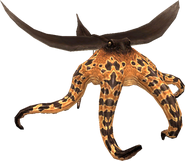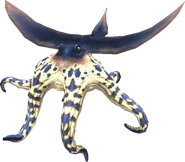Intangir Bot (talk | contribs) m (Bot: Changing template: FFXI Enemies) |
Intangir Bot (talk | contribs) m (Reformatting {{sideicon}} with categoric ancestors) |
||
| Line 1: | Line 1: | ||
| ⚫ | |||
{{FFXI Enemy Family |
{{FFXI Enemy Family |
||
| Family = Sea Monk |
| Family = Sea Monk |
||
| Line 37: | Line 38: | ||
{{Navbox enemies FFXI}} |
{{Navbox enemies FFXI}} |
||
| + | |||
| ⚫ | |||
[[Category:Final Fantasy XI enemies]] |
[[Category:Final Fantasy XI enemies]] |
||
Revision as of 06:47, 4 July 2018
Template:Sideicon Multi-limbed denizens of the ocean, sea monks prove a constant annoyance to peaceful fisherman and intrepid adventurer alike. They have large "wings," which appear to be nothing more than fins, but, amazingly, they are able to float above surfaces. Carnivorous by nature, they are often seen attacking ferry riders, fishermen, and parties that they float upon. Sea Monks appear in two colors, a yellow species and a white species, but both share the same characteristic stripes across their bodies.
With so many limbs at their disposal, Sea Monks prove formidable combatants. They have moderate control over water, but rely mostly on their physical prowess. It should be noted that sea monks are also capable of regeneration as well as shooting out blinding ink from their beaks.
Flesh from sea monks doesn't appear to be anywhere near edible, but their skin is sometimes used by leathercrafters for specialty items. Other than the random seashell, players won't find much of use or value on them.
Several notorious sea monks are known to drop very rare weapons, including a legendary club that mimics their eight-armed combat style.
Special Attacks
- Cross Attack: Twofold single target attack.
- Hard Membrane: Evasion boost.
- Ink Jet: Cone Attack damage and Blind.
- Maelstrom: AoE Water damage and Strength down.
- Regeneration: Regen effect.
- Tentacle: Single target attack.
- Whirlwind: AoE Wind damage and Vitality down.
Etymology
The sea monk (also monk-fish or monkfish) was a sea creature found off the eastern coast of the Danish island of Zealand, almost certainly in 1546. It was described as a "fish" that looked superficially like a monk, and was mentioned and pictured in the fourth volume of Conrad Gesner's famous Historia Animalium. Gesner also referenced a similar monster found in the Firth of Forth, according to Boethius, and a sighting off the coast of Poland in 1531.



